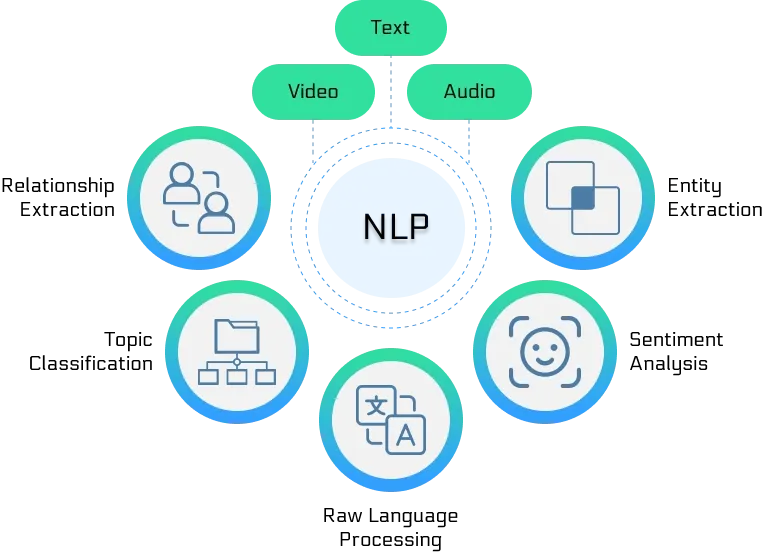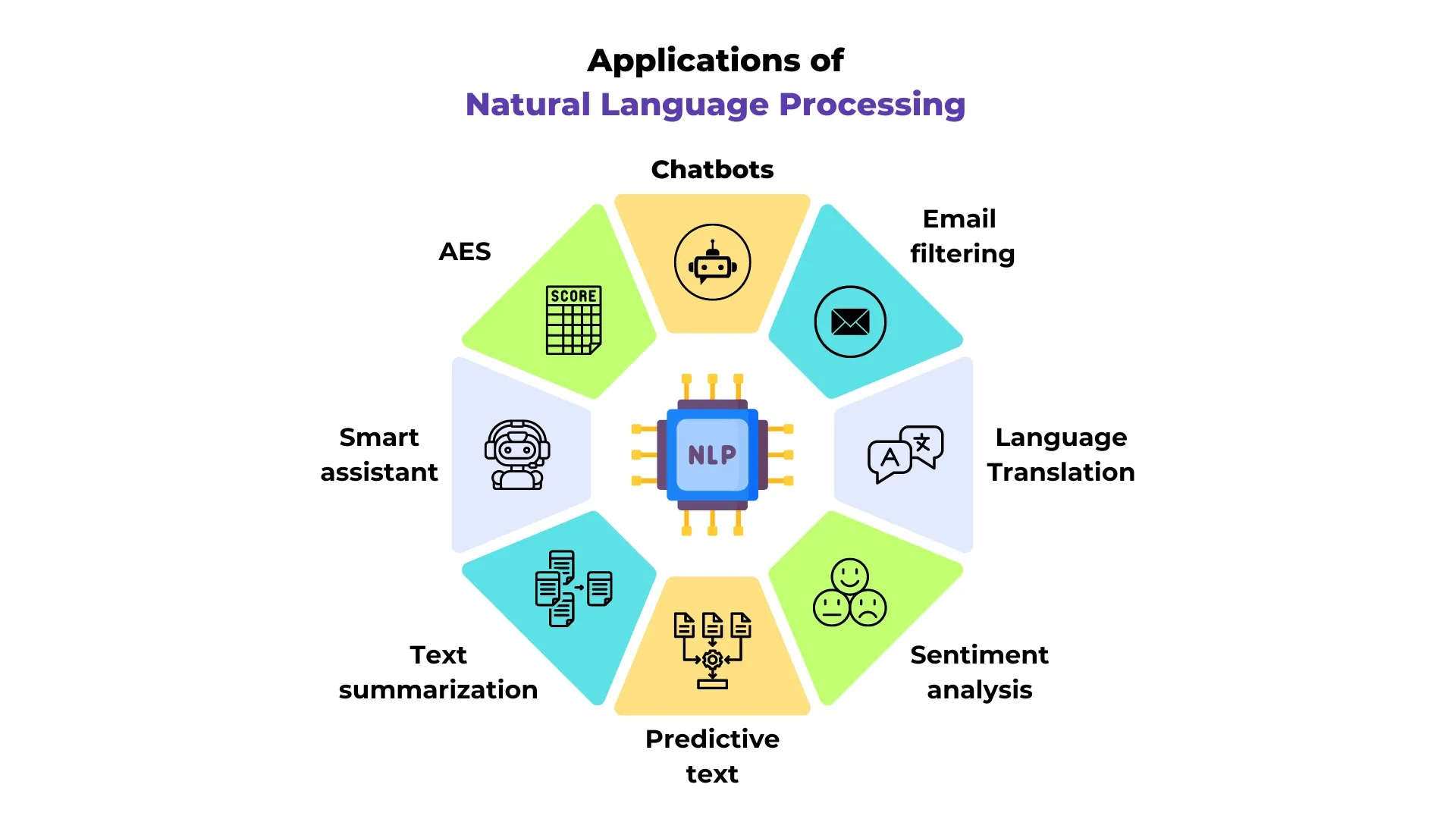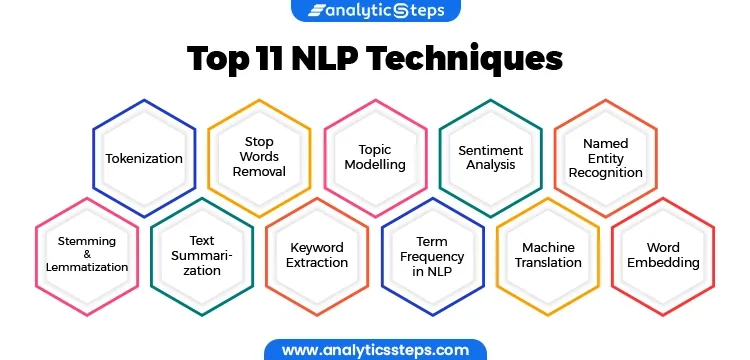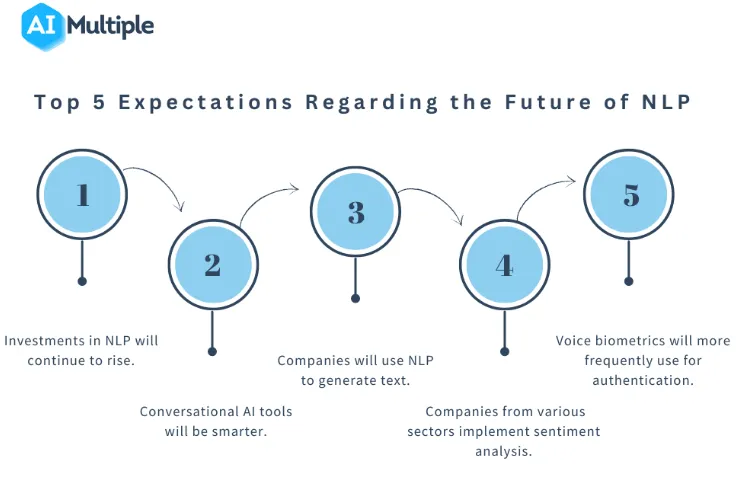Are you tired of the tedium of crafting lengthy search queries for search engines or sifting through an avalanche of spam emails?
Enter the game-changer: Natural Language Processing (NLP).
NLP is an ingenious technology that empowers machines to comprehend human language and emulate lifelike conversations. By discerning patterns and deciphering phrases, NLP is reshaping our interaction with machines and streamlining tasks, elevating convenience.
According to a recent Tractica report, the NLP market is projected to burgeon to $22.3 billion by 2025. From chatbots to voice assistants, NLP has the potential to metamorphose industries, including healthcare, logistics, and finance.
But how does NLP work?
Fret not; sit back, unwind, and embark on an intriguing exploration into the captivating realm of NLP!
What is NLP?
NLP can be defined as a subfield of artificial intelligence that deals with the interaction between machines and humans using natural language.

NLP aims to enable machines to understand, interpret, and respond to human language in a way as close as possible to how humans would do it.
NLP involves using algorithms and statistical models to analyze human language and extract meaning.
Applications of NLP
Let’s look deep into the interesting field of natural language processing (NLP) and examine some of its amazing uses across various sectors.
So, let's get started!

NLP in Different Industries
NLP, a transformative technology, has left an indelible mark across various industries, revolutionizing how operations are conducted and insights are extracted.
Here's a glimpse into its impact on different sectors:
Healthcare
NLP is revolutionizing the healthcare industry by enabling the analysis of advanced medical documents, patient records, and research papers.
It helps doctors extract crucial information from massive amounts of textual data, leading to better diagnoses and personalized treatment plans.
Finance
In finance, NLP plays a vital role in the sentiment analysis of news articles, social media, and financial reports.
By interpreting market sentiments, traders and investors can make well-informed decisions, giving them a competitive edge in the financial market.
Customer Service
NLP-powered chatbots are becoming increasingly popular in customer service. These intelligent bots are trained to understand and respond to customer queries, providing quick and accurate solutions.
They enhance customer satisfaction by providing seamless 24/7 support.
Marketing and Advertising
NLP helps marketers analyze customer feedback, social media trends, and online reviews to gain valuable insights into customer preferences.
Marketers can tailor their campaigns and advertisements accordingly, ensuring maximum impact and customer engagement.
Education
In education, NLP is used to develop intelligent tutoring systems. These systems analyze student responses and provide personalized feedback, enhancing the learning experience.
NLP also aids in automated essay grading, saving valuable time for educators.
Legal
NLP assists legal professionals in reviewing and analyzing legal documents, contracts, and case histories.
This traditionally time-consuming process speeds up, allowing lawyers to focus on higher-level tasks and make well-informed decisions.
Social Media
NLP finds extensive applications in social media analysis. It helps in sentiment analysis, identifying trends, monitoring brand reputation, and detecting emerging issues.
Social media platforms also leverage NLP to improve content recommendation systems and enhance user experience.
How NLP Works: NLP Techniques
Welcome to the section all about Natural Language Processing (NLP) techniques.
Let’s explore four key methods that enable us to analyze and understand text deeper.
So, let's dive in!

Tokenization: Breaking Text into Pieces
One of the fundamental steps in NLP is tokenization. But what exactly does tokenization entail? Simply put, it involves breaking a text into smaller units or tokens.
These tokens could be words, sentences, or even characters. By segmenting text this way, we can perform subsequent analyses more effectively.
The tokenizing text is a building block for various NLP tasks, such as part-of-speech (POS) tagging and named entity recognition.
Part-of-Speech (POS) Tagging: Unraveling Grammar Patterns
Have you ever wondered how computers understand the grammatical structure of sentences? Well, part-of-speech tagging is the answer.
POS tagging is the process of assigning grammatical tags to each word in a sentence. These tags indicate whether a word is a noun, verb, adjective, etc.
By analyzing the distribution of different POS tags, we can gain insights into the syntactic patterns employed in the text. POS tagging is extremely useful for various NLP applications, including text classification, information retrieval, and language translation.
Named Entity Recognition (NER): Spotting the Stars of Text
Named entities play a crucial role in the vast landscape of text data.
Named Entity Recognition, or NER, identifies and categorizes named entities within a text. These entities include people, organizations, locations, dates, or specialized terms.
NER algorithms analyze the context and linguistic patterns to determine the entity type.
By extracting named entities, we can gain valuable information for various purposes, such as entity disambiguation, information retrieval, and question-answering systems.
Sentiment Analysis: Unveiling the Emotion Within
Emotions and sentiments are an integral part of human communication.
Sentiment analysis, often called opinion mining, strives to unveil the underlying emotions within a text.
Employing diverse methodologies, sentiment analysis distinguishes whether the sentiment conveyed in the text is positive, negative, or neutral. This scrutiny finds relevance in domains like product reviews, social media sentiments, and customer feedback.
The utility of sentiment analysis extends to businesses, offering them insight into their customers' broader perspectives and viewpoints.
The possibilities unlocked by these NLP techniques are truly remarkable.
Did you think language processing could be so powerful?
Tokenization, POS tagging, NER, and sentiment analysis are just a glimpse into the vast field of NLP. By leveraging these tools, we can unlock new insights and applications that were previously unimaginable.
What is the Future of NLP?
Natural Language Processing (NLP) has come a long way in recent years, and its future looks brighter. With advancements in machine learning and AI, NLP is poised to revolutionize the way we interact with technology and communicate with each other.
So let’s explore the exciting possibilities for NLP and delve into the emerging trends in NLP research.

Advancements in Machine Learning and AI
Machine learning and AI have played a pivotal role in propelling the advancement of NLP.
Empowered by the escalating data availability and computational prowess, machine learning algorithms have grown more refined and adept at tackling intricate NLP undertakings.
This progress has ushered in notable text classification, sentiment analysis, and machine translation achievements.In parallel, as AI undergoes evolution, NLP follows suit.
Researchers are delving into deep learning methodologies like recurrent neural networks (RNNs) and transformers, venturing to stretch the confines of NLP's capabilities.
These models can capture intricate patterns in language and generate more accurate and context-aware responses.
Emerging Trends in NLP Research
In the world of NLP research, exciting trends are emerging that promise to shape the future of this field. Read about some important trends in NLP research.
Multilingual NLP
While NLP has predominantly focused on English-language processing, there is a growing emphasis on multilingual NLP.
Researchers are developing models that can understand and generate text in multiple languages, enabling seamless communication across linguistic barriers.
Contextual Understanding
Context is crucial for understanding language, and NLP research is increasingly focused on developing models that can comprehend and generate text in context.
This contextual understanding enables machines to generate more relevant and natural-sounding responses, making human-computer interactions more seamless.
Ethical NLP
With great power comes great responsibility. Ethical considerations are becoming increasingly important in NLP research.
Researchers are actively developing unbiased, fair, and respectful models that respect user privacy. This emphasis on ethical NLP ensures that technology benefits everyone and doesn't perpetuate societal biases or invade privacy.
Explainable NLP
As NLP models become more complex and powerful, the need for explainability becomes critical.
Researchers are striving to develop methods that can explain the decision-making process of NLP models, making them more transparent and trustworthy.
Conclusion
After immersing ourselves in the captivating realm of NLP and uncovering its inner workings, one thing is clear: Natural Language Processing stands as an undeniable game-changer
By scrutinizing and comprehending human language, NLP endows machines to interact with us more organically and intuitively.
Contemplating the diverse applications of NLP, from chatbots and voice assistants to language translation, is nothing short of awe-inspiring. And guess what? Here's a fun statistic for you - did you know that NLP algorithms have achieved over 92% accuracy in sentiment analysis? That's pretty impressive!
With the power of NLP, we expect our interactions with technology to become more human-like and seamless.
The future is looking bright for NLP!
BotPenguin is an NLP-powered AI assistant that can automate customer service, marketing, and sales tasks.
BotPenguin is a great way to improve customer service, increase sales, and automate business processes.
Try BotPenguin today for free and see how it can help you grow your business.
Frequently Asked Questions (FAQs)
How is NLP transforming data analysis and insights?
NLP revolutionizes data analysis by extracting valuable insights from vast unstructured text data.
It enables sentiment analysis of customer feedback, trend identification, and sentiment monitoring on social media platforms.
Can NLP understand multiple languages?
Yes, NLP supports multiple languages through techniques like machine translation and multilingual language models.
Advanced NLP models are trained on diverse datasets to comprehend and generate text in various languages.
What are the key components of NLP?
NLP involves various components: tokenization, part-of-speech tagging, syntactic parsing, named entity recognition, and semantic analysis.
These components work together to comprehend and interpret natural language data.
How does NLP handle ambiguity in language?
NLP algorithms use context and statistical models to resolve ambiguity in language.
By considering surrounding words and patterns, NLP can infer the most likely meaning of words or phrases in different contexts.
How does NLP impact chatbots and virtual assistants?
NLP enhances chatbots and virtual assistants by enabling them to understand and respond to user queries naturally.
It allows for human-like language interactions, improving user experiences and more effective communication

